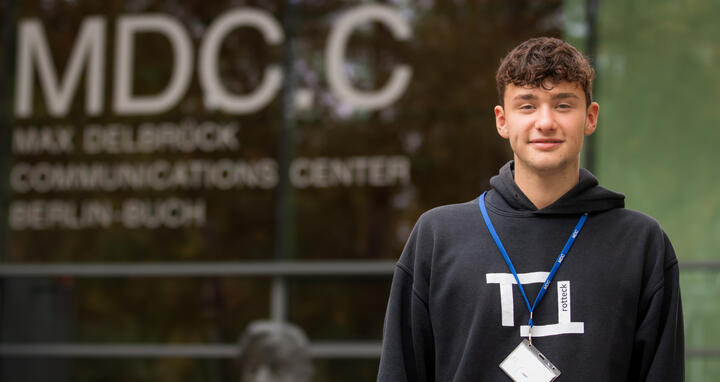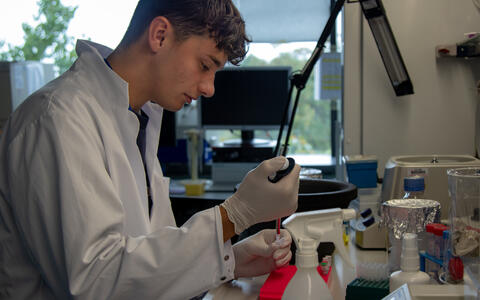"Research can be addictive"
Lukas Baumert often spent his vacation time in the lab. Also on weekends and sometimes even after classes at Rotteck Gymnasium in Freiburg, he hopped on a regional train bound for Strasbourg. There he carried out research side by side with scientists at the university. His topic is cancer in the liver. After one and a half years, he and his older colleagues discovered a survival strategy used by tumor cells. His work contributed to identifying a gene that helps these cells to survive in the body. With his project, Lukas won the “Jugend forscht” regional competition in southern Baden and then took second place in the statewide competition in Baden-Württemberg. One of the prizes was a week in the research hub of Berlin, specifically at the Max Delbrück Center for Molecular Medicine.
“Research can be addictive,” says Lukas. He feels he was very fortunate with his “Jugend forscht” project. “After all,” he says, “It is not a given that everything goes so smoothly from the very start.” Lukas also investigated cancer cells in the Flow Cytometry Platform led by Dr. Hans-Peter Rahn and in the Berlin research group of Professor Thomas Blankenstein. There he even carried out small lab experiments. Certain white blood cells, so-called T cells, patrol and search the body for intruders. Foreign cells, which usually betray themselves by displaying on their surfaces typical markers, are recognized and destroyed by these white blood cells. Cancer cells, on the other hand, hide from the immune system by changing their identifying characteristics. Blankenstein’s team is seeking to genetically manipulate T cells so that they become capable of recognizing cancer cells as invaders. They are currently testing this procedure on mice. Lukas helped to insert the modified genes in mouse blood cells. He doesn’t know yet if this step worked, because it takes a week to see the results.
A career as a researcher, or as a doctor?
Lukas became familiar not only with experiments on animal and human cells, but also animal studies through a previous research internship he did at the German Cancer Research Center (DKFZ) in Heidelberg. During his time at the MDC, Lukas also informed himself about animal studies. He was particularly impressed by the many rules that the scientists have to follow when it comes to gaining permission for animal studies and keeping and dealing with laboratory animals. “I think it makes sense to rigorously regulate such experiments,” says Lukas. “But at the same time, I think it’s crazy that Germans eat so much meat and can keep pets at home without any monitoring.”
Lukas has probably not seen the last of topics such as “animal studies” and “cancer.” In two weeks, he will be starting his medical studies in Tübingen. As a physician, Lukas could one day treat cancer patients, or he could, as a scientist, help develop therapies against cancer. “I find it exciting to first of all study the human being as a whole. But I’m definitely focusing on research, too,” says Lukas. He does not yet know what path he we will eventually take. Perhaps one day Lukas will work at the MDC in Buch.
Text: Christina Anders





